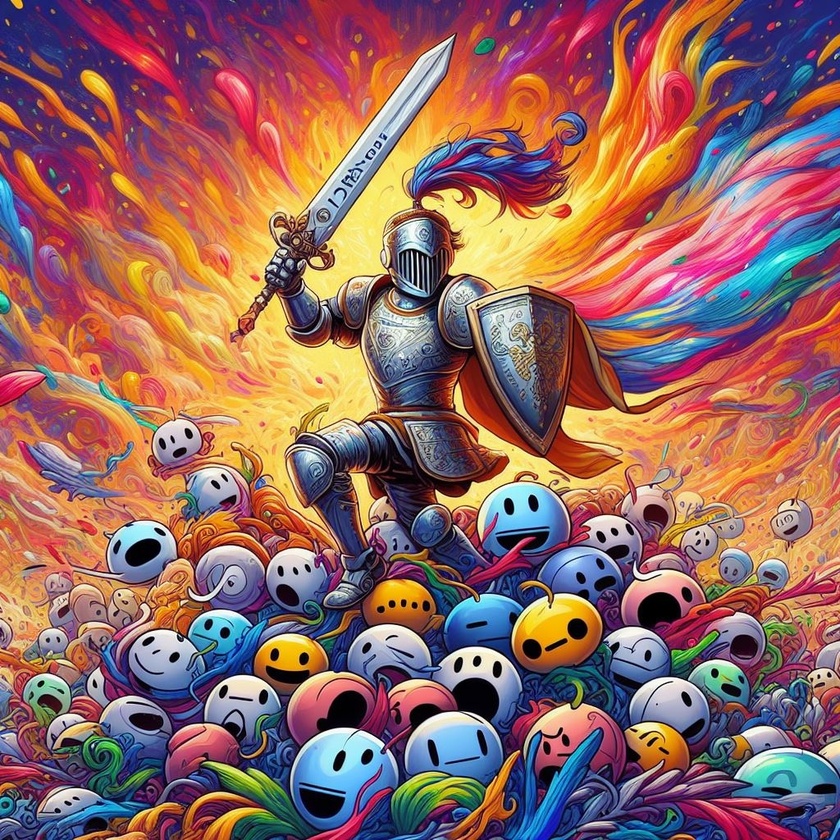«(…) Some writers have had the audacity to believe in the impartiality of the law of democratic nations by challenging throngs of super-paying law firms by opening lawsuits destined, inevitably, to see them lose by risking being ruined by legal fees. By writing notes like these, in the face of the Leviathan dominance of “ Technofeudalism “ (Yanis Varoufakis) one risks indeed being attacked by the dictators of progress.
The problem is not big: it is gigantic ! and not only for the authors, but for all humanity. I touch only on some of the emerging aspects:
- the most obvious is that these bots take in the heap Yottabytes of content from the most disparate media, those available, those not yet available, and those invented, to combine together original ideas making them indistinguishable and assuming the right and authorship
- then there is that of the fake: there are many of us who have observed that prompts often make up out of whole cloth fictional answers ranging from people who never existed, books that were never written, universities that never existed, and summaries or biographies that are utterly bogus and outlandish but drafted with a prosopopopean narrative to make them credible to those who are content to consider them trustworthy because of the value accorded them by techno-gossip.
- the most dystopian but already topical aspect is the distortion of the answers: attribution to authors and people in general of statements, activities, studies, political or ideological expressions that never existed or were subsumed by sheer semantic correlation unsupported, however, by facts that a human mind would have been able to unequivocate. How many corpses run the risk of leaving AI in the name of a common good and progress we would not have wanted and certainly not their victims?
- proscription lists that might follow such as those, in this case created by flesh-and-blood people to whom we could impute the “crime” of instrumentalization, who devinced “friends of Putin” those who demonstrated against supporting any form of Russian-Ukrainian conflict . Just think, however, when one form of automation can generate thousands without fear of denial and, indeed, with the blessing of the innovative product!
- finally the less obvious but much more insidious deletion of unwanted people from the answers (including those they may have contributed to) of chatbots. Let us take the example of a question about nuclear energy in which no mention is made of names such as Enrico Fermi or Einstein. Spend the few generations in which there are people who have studied things in books rather than in search engines and chatbots that can remember them, humans accustomed to these “tools of progress” may believe that nuclear energy is entirely the result of Openheimer’s work because he starred in an Oscar-winning film or because he was a Jewish mother, for example. While this may seem an extreme case, however, let us imagine how little it would take for the existence of the thought of an Ennio Martignago or names far more illustrious than him to be erased from the history of our posterity or from current events themselves? Or that they are erased because they are considered hostile to progress?
All of this, I want to say it very loudly, is not fantasy. Anyone who, like me, saw the 1960s as a child, if back in the 1970s, when he was doing civil battles to defend freedoms or a right to peace at far less risk than today’s, he had been promised a world with the injustices of today’s would have been irritated by over-exaggeration. Let us expect all the worst fantasies to turn into reality.
What can we do to defend ourselves?
From the height of his immense capital, one such as Elon Musk had tried to make access to X, the ex-Twitter, fee-based precisely to prevent chatbot intrusion and robbery. Then it seems he had to give up. However, his strategy is still one of the main ones to defend against at least an initial part of this problem. For now at least the chatbots are not organized in such a way as to cough up even a penny to steal content. However, this does not mean that, perhaps thanks to private or institutional investment, they will not be able to do so in the future.
Then it must be said that while sifting through text is an easy and quick task for increasingly advanced processors like Nvidia’s, processing movies or podcasts, while not impossible, is certainly a bit more challenging. Combining the two, payment and non-text media, a few more things could combine.
(…) I am including in the appendix suggestions obtained through the use of one of these prompts (Phind) regarding some of the possible solutions to ensure protection from chatbots, especially for podcasts, by some of the platforms that can be used
Regarding protection from chatbot access and author privacy, Locals.com does not provide specific details on how it protects content from unauthorized access or how it ensures the privacy of authors of podcasts or content created within the platform. However, the privacy policy emphasizes that the company processes user content to operate and protect services, and that users have control over what information they share on their profile. Users can choose to change or remove this information at any time if they no longer wish to share it 2.
In addition, Locals.com mentions the use of third-party integrations, such as ChatGPT, to suggest personalized ideas for activities. This implies that users may provide information to third parties through these integrations, and Locals.com is not responsible for how these third parties collect or use the information 2.
In conclusion, while Locals.com offers a wide range of features and options for sharing information and content, it does not provide specific details about how it protects content from unauthorized access or how it ensures the privacy of podcast authors. Users who use Locals.com to create and distribute podcasts should be aware of the privacy and security implications of their content, and carefully consider the information and content sharing options within the platform.»



















